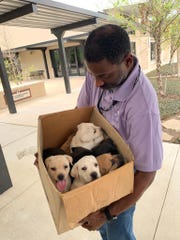Shelter worker's have been put under unprecedented pressure dealing with the restrictions, mandates, and animal surrender's due to the Coronavirus, yet in the midst of this they are seeing unexpected numbers of adoption across the USA, Australia, and other nations.
Dog fostering and adoption up 700 percent during coronavirus Dog fostering and adoption is seeing a 700 percent rise since the outbreak of the coronavirus. https://www.foxnews.com/us/pet-adoptions-and-fostering-spike-during-coronavirus
Busch to give 3 months of free beer to dog adopter's. https://www.foxnews.com/food-drink/busch-free-beer-dog-adoption-coronavirus
Appointment-only and call-ahead adoptions, drive-up fostering and curbside adoptions, online training and at-home volunteer projects (such as making pet toys) are some of the solutions being used nationwide to help care for vulnerable animals during the pandemic.
Contrary to fears, there is no sign so far of rising number of dogs and cats surrendered by people too sick to take care of them, or people who have lost their jobs and can't afford to take care of them. Not yet.
"We have not seen an increase in owner surrenders or stray intakes at the ASPCA Adoption Center in (hard-hit) New York City due to the virus, and based on our conversations with animal welfare professionals across the country, that (uptick) is not evident on a national level," says Matt Bershadker, president and CEO of the national ASPCA, the American Society for the Prevention of Cruelty to Animals.
"I just confirmed with a random sampling of shelter leaders that they are not seeing an uptick in animal intakes at shelters in their communities," says Jim Tedford, president and CEO of the Association for Animal Welfare Advancement, the professional organization for the shelter industry.
Still, shelters are bracing for that possibility and planning for it, both leaders say.
"We don’t know what will happen as the numbers of sick and deceased increases, nor do we know what impact the financial stresses might have," Tedford says "But for now we’ve seen communities step up and help reduce shelter populations rather than the other way around."
Whatever the reason, it's a boon to some of the 7.6 million homeless dogs and cats who enter public and private shelters every year, according to the Humane Society of the U.S.
"Over the past week, we have seen a nearly 70% increase in animals going into foster care through our New York City and Los Angeles foster programs, compared to the same time period in 2019," says Bershadker.Tedford cites similar numbers from a Pethealth database that covers about 1,400 shelters and organizations around the country: Adoptions are up 102% from the prior week, 100% from last year, he says, and fosters are up 193% from the prior week and 197% compared to this time last year.
Intakes are down 68% from this time last year because shelters have stopped taking new animals in all but emergency-related situations, he says.
"We have never navigated anything like COVID-19 – it's completely uncharted territory for shelters and rescues," Alboum says. "Hurricanes and tornadoes … impact one area or region and we can move animals, fly them or drive them to shelters elsewhere to make room for incoming animals. We can’t for this because it’s a national disaster."

Don Specks, animal services manager at the Houston SPCA, holds a box of puppies abandoned in the parking lot on March 24, 2020. They will go into foster care. (Photo: Houston SPCA)A big disruption: Coronavirus has largely grounded animal transports because of state lock-downs and airline flight reductions. Tedford's database shows transfers and transports are down 62% compared to this time last year.
That means homeless pets from overburdened Gulf states, for instance, can't be flown to winter-stressed corners of the country where there aren't as many strays for adoption this time of year.
"We depend heavily on a transport program to move 5,000 dogs and cats (a year) into adoptive homes in Northern states, from ours and other Southern shelters," says Ginny Sims, director of Southern Pines Animal Shelter in Hattiesburg, Mississippi, which began early to push adoptions and fosters to empty out Southern shelters as much as possible. . "It's incredibly challenging in the South, where we already have big over-populations" of strays.
https://www.usatoday.com/story/entertainment/celebrities/2020/03/27/animal-adoptions-shelters-get-creative-pair-parents-pets-amid-coronavirus/2907199001/


No comments:
Post a Comment